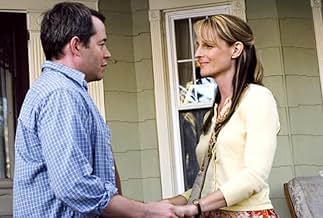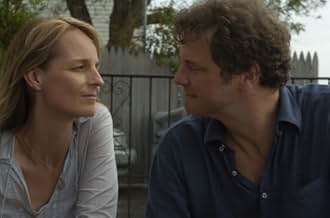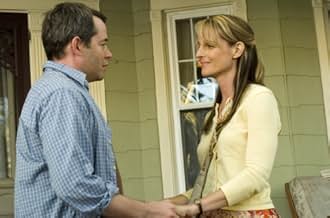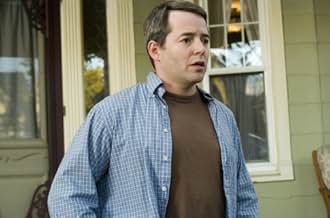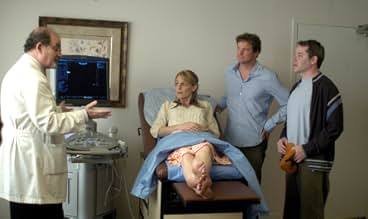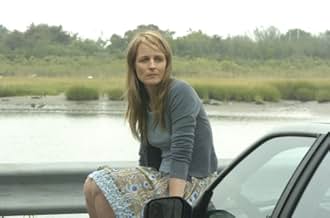PUNTUACIÓN EN IMDb
5,9/10
11 mil
TU PUNTUACIÓN
Una profesora de Nueva York sufre una crisis aguda debido a una serie de desdichados sucesos; su único consuelo será el padre de uno de sus alumnos.Una profesora de Nueva York sufre una crisis aguda debido a una serie de desdichados sucesos; su único consuelo será el padre de uno de sus alumnos.Una profesora de Nueva York sufre una crisis aguda debido a una serie de desdichados sucesos; su único consuelo será el padre de uno de sus alumnos.
- Dirección
- Guión
- Reparto principal
- Premios
- 3 premios y 1 nominación en total
Lillias White
- Sheila
- (as Lillias D. White)
Kenneth Stern
- Rabbi
- (as Rabbi Kenneth A. Stern)
Reseñas destacadas
In a featurette on the DVD release version of THEN SHE FOUND ME writer (with Alice Arlen and Victor Levin) /producer/director Helen Hunt shares a ten year journey to have a film made of a novel by Elinor Lipman. Her cast shares in the very sentimental story of Hunt's devotion and seemingly endless charisma and abilities. The explanation for making this budget film are in many ways more successful than the film, a work the cast seems determined to classify as a comedy but a work that is far more a human drama.
April Epner (Helen Hunt) is married to fellow schoolteacher Ben Green (Matthew Broderick) and longs to have a baby before her advancing age prevents her dream. April was adopted as an infant by a Jewish couple who subsequently gave birth to April's brother Freddy (Ben Shenkman): April has always longed to have been Freddy's biological equal, wondering what it would feel like NOT to be adopted. April's busy life implodes: Ben has decided he doesn't like his life and leaves April, April's mother dies, April meets Frank (Colin Firth) a recently divorced writer and father of two children, and April is contacted by a man who can put April in touch with her birth mother - popular TV talk show hostess Bernice Graves (Bette Midler). And if these turns of events weren't traumatic enough, April discovers that she has become pregnant by Ben and Ben is unsure whether he can handle the restructuring of his life to accommodate April. Cautiously April and Frank begin a rather tenuous courtship which is almost immediately threatened by April's discovery of her pregnant state. April and Bernice meet, exchange backgrounds, and make pacts to test their biologic relationship. How each of these characters makes promises that eventually damage each other and then resolve in unexpected ways becomes a study of the meaning of love and compassion among fragile human beings.
While not a satisfying story on every level and a film too cluttered with inconvenient editing choices, the cast is strong and obviously committed, and the story (neither a comedy or a drama but a mixture of the two) tests credibility. But there are some fine moments and the lessons in human behavior are worth examining. Not a great movie but a strong little small budget film. Grady Harp
April Epner (Helen Hunt) is married to fellow schoolteacher Ben Green (Matthew Broderick) and longs to have a baby before her advancing age prevents her dream. April was adopted as an infant by a Jewish couple who subsequently gave birth to April's brother Freddy (Ben Shenkman): April has always longed to have been Freddy's biological equal, wondering what it would feel like NOT to be adopted. April's busy life implodes: Ben has decided he doesn't like his life and leaves April, April's mother dies, April meets Frank (Colin Firth) a recently divorced writer and father of two children, and April is contacted by a man who can put April in touch with her birth mother - popular TV talk show hostess Bernice Graves (Bette Midler). And if these turns of events weren't traumatic enough, April discovers that she has become pregnant by Ben and Ben is unsure whether he can handle the restructuring of his life to accommodate April. Cautiously April and Frank begin a rather tenuous courtship which is almost immediately threatened by April's discovery of her pregnant state. April and Bernice meet, exchange backgrounds, and make pacts to test their biologic relationship. How each of these characters makes promises that eventually damage each other and then resolve in unexpected ways becomes a study of the meaning of love and compassion among fragile human beings.
While not a satisfying story on every level and a film too cluttered with inconvenient editing choices, the cast is strong and obviously committed, and the story (neither a comedy or a drama but a mixture of the two) tests credibility. But there are some fine moments and the lessons in human behavior are worth examining. Not a great movie but a strong little small budget film. Grady Harp
The first forty or so minutes of "Then She Found Me" are quite excellent, with Hunt showing impressive skill for a rookie director, the score standing out as quite good, and the acting being very good. The script is surprisingly funny for the most part, and has a sense of authenticity and realism that works in favor of the film. The main problem with the film going past the halfway mark is that little of any real interest is happening, and nothing really stands out. It's still amusing, still well-made, still not a bad film by any stretch of imagination, but there's also absolutely nothing that left me wanting to see it again.
6.5/10
6.5/10
We've all had our share of bad weeks and I've heard numerous times before that when it rains it pours but yet that still doesn't seem to account for what happened to April Epner (Helen Hunt). A mere ten months into her marriage to Ben (Matthew Broderick), he decides he made a huge mistake. The next day, she goes to work, a school where she and Ben both taught to primary students, to find that he never showed up and is nowhere to be found. Within the week that follows, her adopted mother (Lynn Cohen) dies and her birth mother (Bette Midler) makes contact with her for the first time. It's no wonder the bags under April's eyes are so heavy.
Hunt's directorial debut, THEN SHE FOUND ME, begins so tragically but attempts then to lighten the mood with awkward comedy and untimely romance. The combination is a bizarre contradiction that just falls flat. It doesn't feel right to laugh just yet as there hasn't been time to mourn but we don't want to mourn either as we only just met these folks. We don't know how to feel or where to go and neither does the direction of the film. When the dust from April's disastrous week finally begins to settle, the film finally begins to breathe normally again and finds a particular charm in its decidedly neurotic voice. Still, it is more unsettling than it is satisfying.
While Hunt may be overly sentimental as a director, she finds a certain harshness in her acting style that becomes the film's most unifying source. As put upon as she is at this juncture in her life, she manages to juggle everything reasonably well by balancing between protecting herself, demanding what she deserves and allowing her defenses down at just the right moments and only to those who deserve entry. The woman deserves happiness, be that in the form of a new love with troubled suitor, Frank (Colin Firth), or by realizing her longtime desire to have a child, but her life only gets continuously more complicated, sometimes by her own doing. I would ordinarily want to hug someone in April's position but mostly I just wanted to shake her.
What ultimately undermines THEN SHE FOUND ME is its own air of self-loathing. Hunt spends so much time trying to incite sympathy for April by dumping so many hard realities on to her at once but then punishes her when all she has done is try to keep her head above water. It's hard to feel love for a face on the screen when the woman who put her there hasn't made up her mind herself.
Hunt's directorial debut, THEN SHE FOUND ME, begins so tragically but attempts then to lighten the mood with awkward comedy and untimely romance. The combination is a bizarre contradiction that just falls flat. It doesn't feel right to laugh just yet as there hasn't been time to mourn but we don't want to mourn either as we only just met these folks. We don't know how to feel or where to go and neither does the direction of the film. When the dust from April's disastrous week finally begins to settle, the film finally begins to breathe normally again and finds a particular charm in its decidedly neurotic voice. Still, it is more unsettling than it is satisfying.
While Hunt may be overly sentimental as a director, she finds a certain harshness in her acting style that becomes the film's most unifying source. As put upon as she is at this juncture in her life, she manages to juggle everything reasonably well by balancing between protecting herself, demanding what she deserves and allowing her defenses down at just the right moments and only to those who deserve entry. The woman deserves happiness, be that in the form of a new love with troubled suitor, Frank (Colin Firth), or by realizing her longtime desire to have a child, but her life only gets continuously more complicated, sometimes by her own doing. I would ordinarily want to hug someone in April's position but mostly I just wanted to shake her.
What ultimately undermines THEN SHE FOUND ME is its own air of self-loathing. Hunt spends so much time trying to incite sympathy for April by dumping so many hard realities on to her at once but then punishes her when all she has done is try to keep her head above water. It's hard to feel love for a face on the screen when the woman who put her there hasn't made up her mind herself.
Having just seen "Baby Mama", which covers the same emotional territory but in much broader slapstick terms, this 2008 serio-comedy is driven far more by character than situation. In this case, the protagonist is 39-year-old April Epner, a New York schoolteacher who was raised in a close-knit Jewish family and desperately wants the biological connection of a birth child before her alarm clock goes off. She marries fellow teacher Ben, an inarticulate schlub with a terminal case of the Peter Pan Syndrome. After a brief time, he wants out of the marriage, and at almost the same time, April's adoptive mother Trudy dies. Not even a month goes by before April's biological mother suddenly shows up in the form of the brazenly overbearing but genuinely likable Bernice Graves, a cable talk-show hostess who is something of a local media celebrity. If life was not complicated enough, April also finds herself drawn to Frank, the single father of one of her pupils. Unlike Ben, he feels the same about April but is fighting his own bitterness about his own recent divorce.
Not only does Helen Hunt star as April, but she also co-wrote the screenplay with Alice Arlen and Victor Levin and makes her big-screen directorial debut. Granted she's more impressive as an actress than a filmmaker, but as a director and writer, she makes the most of a storyline that stacks the deck a bit like a Lifetime TV-movie. There are enough realistic surprises that take the plot off the rails in a good way. Looking gaunt and avoiding much make-up, Hunt is really playing a variation of the beaten-down waitress she played in "As Good As It Gets", as she carries that same constantly pained expression of disappointment and looks about to explode during moments of emotional duress. However, a decade later, Hunt inhabits the character more naturalistically this time and with a deeper sense of vulnerability and haggard exhaustion. Perhaps to minimize any unnecessary dramatic risk, Hunt cast the other principal roles with actors playing familiar parts. Matthew Broderick effectively portrays Ben as the perpetually dazed man-child he is, while perennial love interest Colin Firth gives texture to the seemingly ideal suitor Frank, especially as he edges toward the breaking point in tolerating the sum of April's foibles.
In one of her increasingly rare screen appearances, Bette Midler gives a scene-stealing performance as Bernice. She lights up the movie with Bernice's unfettered sense of abandonment while gradually exposing the secrets that threaten to undermine her newly found relationship with her daughter. Other parts are played with minimum fuss - Ben Shenkman as April's physician brother Freddy feeling put-upon for having a biological tie to their mother, and Salman Rushdie (author of "The Satanic Verses" which brought him a death sentence from the Ayatollah Khomeini in 1989) as April's doctor. Hunt provides her actors, especially herself, plenty of good, meaty scenes with opportunities for bravura moments. It just doesn't quite come together as a whole by the end, and that may be that Hunt is so used to the sitcom format of the long-running series, "Mad About You". The result is that some laughs feel a bit contrived, some scene transitions seem jarring, and some expected character revelations are given short shrift. Nonetheless, the dramatic developments toward the end carry the emotional impact necessary to make the movie truly affecting, and Hunt should be given credit for a most auspicious debut as a filmmaker.
Not only does Helen Hunt star as April, but she also co-wrote the screenplay with Alice Arlen and Victor Levin and makes her big-screen directorial debut. Granted she's more impressive as an actress than a filmmaker, but as a director and writer, she makes the most of a storyline that stacks the deck a bit like a Lifetime TV-movie. There are enough realistic surprises that take the plot off the rails in a good way. Looking gaunt and avoiding much make-up, Hunt is really playing a variation of the beaten-down waitress she played in "As Good As It Gets", as she carries that same constantly pained expression of disappointment and looks about to explode during moments of emotional duress. However, a decade later, Hunt inhabits the character more naturalistically this time and with a deeper sense of vulnerability and haggard exhaustion. Perhaps to minimize any unnecessary dramatic risk, Hunt cast the other principal roles with actors playing familiar parts. Matthew Broderick effectively portrays Ben as the perpetually dazed man-child he is, while perennial love interest Colin Firth gives texture to the seemingly ideal suitor Frank, especially as he edges toward the breaking point in tolerating the sum of April's foibles.
In one of her increasingly rare screen appearances, Bette Midler gives a scene-stealing performance as Bernice. She lights up the movie with Bernice's unfettered sense of abandonment while gradually exposing the secrets that threaten to undermine her newly found relationship with her daughter. Other parts are played with minimum fuss - Ben Shenkman as April's physician brother Freddy feeling put-upon for having a biological tie to their mother, and Salman Rushdie (author of "The Satanic Verses" which brought him a death sentence from the Ayatollah Khomeini in 1989) as April's doctor. Hunt provides her actors, especially herself, plenty of good, meaty scenes with opportunities for bravura moments. It just doesn't quite come together as a whole by the end, and that may be that Hunt is so used to the sitcom format of the long-running series, "Mad About You". The result is that some laughs feel a bit contrived, some scene transitions seem jarring, and some expected character revelations are given short shrift. Nonetheless, the dramatic developments toward the end carry the emotional impact necessary to make the movie truly affecting, and Hunt should be given credit for a most auspicious debut as a filmmaker.
"Then She Found Me" is a wretched movie, and it should not be. The talent here is undeniable: Helen Hunt, Colin Firth, Matthew Broderick, Bette Midler. The problem? An unforgivably awful script. Can anyone in Hollywood read? Hollywood is a world capital of entertainment, of magic; there is so much talent there. And yet, year after year, these awful scripts are greenlighted and talented writers starve. What gives?
The main character, April Epner (Helen Hunt) is never fleshed out. What we do know about her makes her incredibly unappealing. She's obsessed with her plump, middle-aged, boy-man husband (Broderick) who has left her to live in his mother's house. April is shrill and rude to her dying mother. She's manipulative and callow in her interactions with Colin Firth, the man all sensible women love and would treat like the treasure he is. In a particularly painful scene, Frank (Firth) makes a poignant confession of love to April, and she blows him off in order to gripe to her husband in a cell phone call. I was literally shouting at the screen, "Run, Colin, run! Get away from this nasty loser female as fast as ever you can!" It doesn't stop there. April attempts to have a quickie with her husband in the back seat of a car. On a busy city street. In broad daylight. With the car door open. It was such an ugly, gratuitous scene. It marked April as someone suffering from borderline personality disorder. But it doesn't stop there. April casually invites both her husband and her boyfriend to her gynecologist's office for an exam, in stirrups and johnny coat, to ascertain that she is pregnant, by her husband. WHY should we care about this woman? Why should Colin Firth be attracted to her? What inspired his poignant love confession? Nothing. There is nothing on screen, nothing in the script, that ever fleshes his attraction out.
Speaking of "flesh" if you read comments here or on the web, you can see that most viewers were fixated on how haggard Helen Hunt looks. She is very thin, and time has not been kind to her face. In some scenes, it is impossible to look at her and not want to sit her down and get some food into her, she looks that much like a refugee from some catastrophe. Some viewers applauded Hunt for being "brave" and allowing the camera access, but focusing on Helen Hunt's courage utterly detracts from ever registering April Epner as a flesh and blood human being. You're not thinking about April Epner, you're thinking, "Hmm how could Helen Hunt change her look?" Similarly, Bette Midler is never convincing as the character she is playing. She is always Bette Midler, bodacious saloon singer, breezing through a film with a script that is decidedly unworthy of any attempt on her part to bother to pretend to be anyone but Bette Midler.
Failed films like this are so painful because there are so few movies made for women over forty. The glory days that could produce a script like Mankiewicz's "All About Eve" are long behind us. Drek like this make us miss classics like that all the more. Older women do lead interesting lives. There are so many real questions that this film could have explored for a forty-plus schoolteacher whose husband wants to leave her. This film ignored all of those real questions and just plopped Colin Firth, the perfect man, and Bette Midler, STAR, in as phony, bogus attempts to stir up some kind of a plot. Sorry without writing talent and insight, which this script utterly lacks even starpower like Firth's and Middler's can't create a worthy film.
The main character, April Epner (Helen Hunt) is never fleshed out. What we do know about her makes her incredibly unappealing. She's obsessed with her plump, middle-aged, boy-man husband (Broderick) who has left her to live in his mother's house. April is shrill and rude to her dying mother. She's manipulative and callow in her interactions with Colin Firth, the man all sensible women love and would treat like the treasure he is. In a particularly painful scene, Frank (Firth) makes a poignant confession of love to April, and she blows him off in order to gripe to her husband in a cell phone call. I was literally shouting at the screen, "Run, Colin, run! Get away from this nasty loser female as fast as ever you can!" It doesn't stop there. April attempts to have a quickie with her husband in the back seat of a car. On a busy city street. In broad daylight. With the car door open. It was such an ugly, gratuitous scene. It marked April as someone suffering from borderline personality disorder. But it doesn't stop there. April casually invites both her husband and her boyfriend to her gynecologist's office for an exam, in stirrups and johnny coat, to ascertain that she is pregnant, by her husband. WHY should we care about this woman? Why should Colin Firth be attracted to her? What inspired his poignant love confession? Nothing. There is nothing on screen, nothing in the script, that ever fleshes his attraction out.
Speaking of "flesh" if you read comments here or on the web, you can see that most viewers were fixated on how haggard Helen Hunt looks. She is very thin, and time has not been kind to her face. In some scenes, it is impossible to look at her and not want to sit her down and get some food into her, she looks that much like a refugee from some catastrophe. Some viewers applauded Hunt for being "brave" and allowing the camera access, but focusing on Helen Hunt's courage utterly detracts from ever registering April Epner as a flesh and blood human being. You're not thinking about April Epner, you're thinking, "Hmm how could Helen Hunt change her look?" Similarly, Bette Midler is never convincing as the character she is playing. She is always Bette Midler, bodacious saloon singer, breezing through a film with a script that is decidedly unworthy of any attempt on her part to bother to pretend to be anyone but Bette Midler.
Failed films like this are so painful because there are so few movies made for women over forty. The glory days that could produce a script like Mankiewicz's "All About Eve" are long behind us. Drek like this make us miss classics like that all the more. Older women do lead interesting lives. There are so many real questions that this film could have explored for a forty-plus schoolteacher whose husband wants to leave her. This film ignored all of those real questions and just plopped Colin Firth, the perfect man, and Bette Midler, STAR, in as phony, bogus attempts to stir up some kind of a plot. Sorry without writing talent and insight, which this script utterly lacks even starpower like Firth's and Middler's can't create a worthy film.
¿Sabías que...?
- CuriosidadesFeature film writing, directing, and producing debut for Helen Hunt. She also acted.
- PifiasThe ultrasound picture at six weeks is not developmentally correct. At six weeks, the baby's features (hands, spine, etc.) would not be able to be distinguished; it would look more like a bean in shape.
- Citas
April Epner: Your wife was seeing someone else?
Frank: Pretty much everyone else. I was too much for her.
April Epner: Your wife? I'm sure she didn't feel that way.
Frank: She told me.
April Epner: What did she say?
Frank: 'You're too much for me.'
April Epner: Ugh.
- Banda sonoraMazel Tov Zelda - Zeydns Tants
Written by Dave Tarras
Performed by The Klezmatics
Courtesy of Rounder Records
Selecciones populares
Inicia sesión para calificar y añadir a tu lista para recibir recomendaciones personalizadas
- How long is Then She Found Me?Con tecnología de Alexa
- Is "Then She Found Me" based on a book?
- How closely does the movie follow the book?
- What is the poem that Bernice quotes?
Detalles
Taquilla
- Presupuesto
- 3.500.000 US$ (estimación)
- Recaudación en Estados Unidos y Canadá
- 3.735.717 US$
- Fin de semana de estreno en EE. UU. y Canadá
- 72.594 US$
- 27 abr 2008
- Recaudación en todo el mundo
- 8.443.998 US$
- Duración1 hora 40 minutos
- Color
- Mezcla de sonido
- Relación de aspecto
- 1.85 : 1
Contribuir a esta página
Sugerir un cambio o añadir el contenido que falta

Principal laguna de datos
What is the German language plot outline for Cuando ella me encontró (2007)?
Responde






